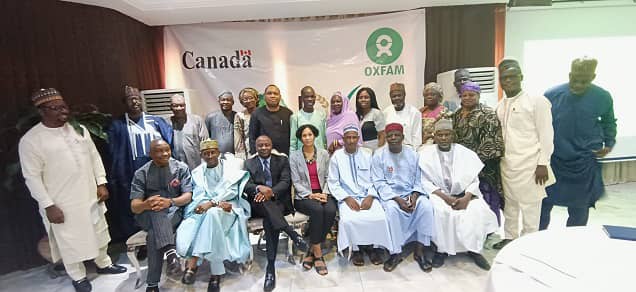
By Angela Atabo
The Canadian Government’s 10 million dollars Livelihood and Nutritional Empowerment (LINE) project implemented by Oxfam in Bauchi state has empowered 16,598 smallholder farmers.
Dr Vincent Ahonsi, Country Director of Oxfam, made this known at the Line Project Close-out and Lessons’ Dissemination event which held from Dec. 12th to 13th in Abuja.
According to Ahonsi, although the project targeted 10,000 smallholder farmers at the beginning, however, it ended up capturing a total of 16,598 smallholder farmers in six local governments in Bauchi with 60 per cent of the beneficiaries as women.
He said that prior to the project in Bauchi state, farmers were facing challenges of inadequate farm inputs, poor agricultural yields, food insecurity, lack of awareness of healthy food diversity for nutritional balance, and malnutrition.
He said the project which has been running for six years empowered six Local Government Areas of Tafawa Balewa, Alkaleri, Ningi, Darazo, Shira and Gamawa with dry season farming inputs including seedlings, fertilizers and herbicides.
“Today we are gathered here to officially close out the Government of Canada funded, Oxfam-implemented Livelihoods & Nutritional Empowerment (LINE).
The project agreement was signed between the Government of Canada and Oxfam on March 21st 2016, and the implementation was carried out in Bauchi State.
“Inadequate farm inputs, poor agricultural yields, food insecurity, lack of awareness of healthy food diversity for nutritional balance, and malnutrition were some of the challenges in the state.
“Reversing these hitherto inadequate agricultural inputs, high incidence of pests and diseases, low agricultural yields, and resultant food insecurity, malnutrition and poverty were the tasks that the LINE Project engaged in.’’
Ahonsi said the project trained farmers on climate-smart agriculture engaged in financial inclusion, which is setting up village savings and loans, associations and cooperatives by the people.
He said the project provided over 1400 boreholes as well as over 700 pumping machines to facilitate dry season farming in Bauchi state.
According to him, the project is a demonstration of a robust cooperation between the governments of Canada and Nigeria, through the Federal Ministry of Finance, Budget and National Planning, the Bauchi State Government and Oxfam.
Ms Djifa Ahado, Head of Development Cooperation, High Commission of Canada to Nigeria, said Global Affairs Canada applauds the collaboration the LINE project enjoyed from the Bauchi state and the local governments.
Ahado expressed satisfaction over the LINE project’s journey adding that it ended with very tangible results.
“In retrospective, this project was approved before Canada had launched its feminist international assistance policy, and yet, all project interventions were designed with women in mind, and were testing ways to reach gender equality in communities, within local government and at the state levels.”
“This type of collaboration is key for the project implementation, but more importantly for the sustainability of results and impacts.
In all projects we have here in Nigeria, this is the type of collaboration we are looking for in order to support self-reliance and continuously ensure the relevance of our projects for people, communities, local governments and states.
“The project monitoring visits conducted throughout the seven years of the project revealed that about 90 per cent of its expected outputs and outcomes were achieved.’’
Mr Saleh Giade, the PSC Chairman and Permanent Secretary, Bauchi State Ministry of Budget and Planning, said that the LINE Project recorded huge successes in the selected six local government areas.
Giade said that there were plans to extend the lessons learnt from the project to other local governments in the state.
Some beneficiaries of the project expressed gratitude to the Canadian government and its implementing partner Oxfam for the privilege.
Ms Fatima Aminu, a beneficiary said before the project she was struggling financially but with the knowledge and empowerment she received, she was able to engage in dry season farming.
She said Oxfam gave them a pumping machine for irrigation and her farm had more yield, unlike during the wet season farming.
“Oxfam gave us economic trees to plant which is another way of fighting desertification, we were given seeds which we have been replicating, and we were also linked to where we can buy fertilizer at a cheaper rate.’’
Ms Hajaratu Pisagih , a partner in the Women Empowerment Initiative Bauchi state, said the project touched the lives of women in the state.
Pisagih said prior to the project ,women were marginalised, however, the project made it possible for women to participate in decision-making, have farms of their own, and engage in dry season farming .
She said this has increased productivity and gain and has brought a lot of resources to their families.
“We also introduced to a savings scheme where we save money, a woman who has never held N5000 of her own got about N300, 000 after the savings and it has put smiles on their families and the communities”.